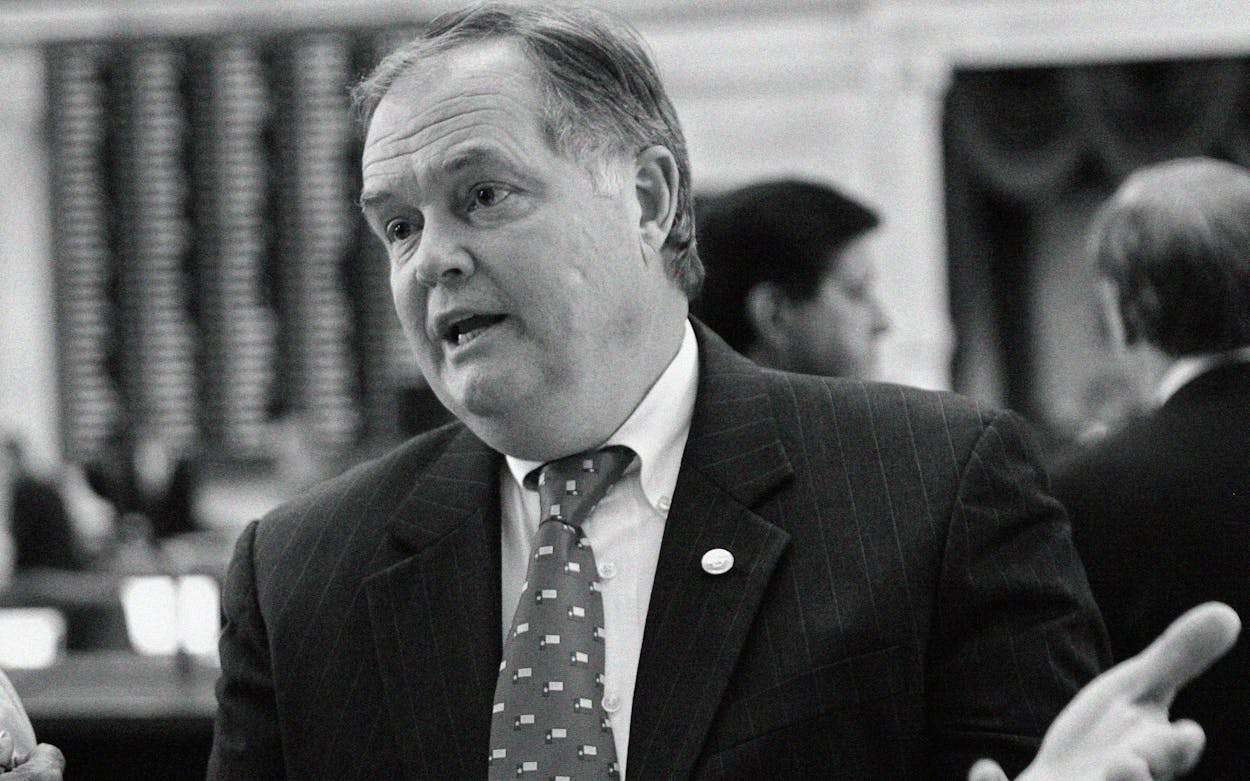If you’re not paying attention to this year’s Republican primary for a seat on the Texas Railroad Commission—and relatively few voters are—you should be. This vitally important election of one of the state’s top energy regulators will have a significant impact on whether Texas’s natural gas infrastructure freezes up again and contributes to widespread blackouts, as it did a year ago. While it no longer helps set global oil prices, as it did in the forties and fifties, the Railroad Commission still oversees fossil-fuel production and pipelines. And, if all that’s not enough to draw your interest, the race has taken three unexpected turns during the past couple of weeks—involving death, alleged corruption, and barely covered breasts.
Incumbent Wayne Christian, a Grammy-nominated gospel singer turned state representative from the small East Texas town of Center, faces four challengers in the March 1 primary. The winner will square off in the fall against Democrat Luke Warford, an Austin energy consultant and former strategist with the Texas Democratic Party, who faces no primary opposition.
Earlier this month, the Odessa American broke the story of a landowner lawsuit involving a proposed oil-field waste dump north of Midland. The Railroad Commission staff recommended against the proposal, but Christian voted in favor of it. Three days later, the group headquartered in Center that was behind the dump gave Christian a $100,000 campaign contribution. None of that is necessarily illegal, but Houston Chronicle columnist Chris Tomlinson didn’t mince words when he wrote this week that Christian “demonstrated what at best is a profound disregard for ethics, and at worst, engaged in public corruption.” Christian told Texas Monthly via email that the Railroad Commission’s general counsel advised him to approve the permit as long as the facility used a modern clay liner, which it did. He added, “My opponents are mudslinging out of desperation because I am the only candidate in this race with the endorsements, campaign infrastructure, and resources necessary to win this race.”
A few days after the American article appeared, the race took another turn when candidate Marvin “Sarge” Summers, owner of an oil-field networking website from Lubbock, died in a car accident outside Midland while traveling between campaign appearances. He was driving a Cadillac Escalade that hit the rear of a tanker truck.
Then, on Super Bowl Sunday, another candidate, oil and gas attorney Sarah Stogner, posted a short video on TikTok and Twitter to implore Texans to “please vote early.” In the video, she rides a pump jack while wearing only a hat, underwear, and pasties. Stogner, who isn’t accepting campaign contributions, cheekily wrote on the post, “They said I needed money … I have other assets.” In an interview with Texas Monthly, and on LinkedIn, Stogner defended her video. “Please tell me how I am supposed to get the media’s attention so I can discuss these important issues,” she wrote. “I’ve been trying. For years. And guess what finally worked? Five seconds of me scantily clad on top of a pump jack.”
The San Antonio Express-News had previously endorsed Stogner, writing that she “offers the vision, energy, and tenacity to make real changes at the RRC.” But the newspaper withdrew its endorsement on Tuesday, in the wake of her post. “We expect candidates for public office to model civil discourse and decorum worthy of the public’s trust,” its editorial board said.
This statement raises questions about what constitutes “civil discourse” in today’s political landscape and whether such standards are applied equally to candidates. For example, the Express-News endorsed Nick Moutos in the 2020 Republican primary for the Thirty-fifth Congressional District, calling him “easily the most qualified of the Republican candidates.” Yet, just a few days before, Moutos had tweeted “If @TheDemocrats want civil war, they’d do well to remember #WeThePeople own more guns than the entire population of #America.” Unlike Stogner, Moutos didn’t say “please.”
When I raised the matter of the Moutos post with Stogner, she replied: “I have boobs; welcome to having boobs, Russell. When you have boobs, you get held to different standards.” (A few months after losing the primary, Moutos lost his job as a state assistant attorney general, after he posted tweets that the Texas Tribune described as “threatening violence against progressives, spouting racist and transphobic rhetoric, casting doubt over the seriousness of the coronavirus pandemic, and sharing QAnon conspiracy theories.”)
The Express-News switched its endorsement to Dawayne Tipton, a former roughneck from Killeen who worked his way up into management. Tipton has won the support of the editorial boards of most of the state’s major papers, including the Houston Chronicle and the Dallas Morning News. He touts his experience in the oil patch and has attacked the Railroad Commission for failing to act quickly to ensure that natural gas pipelines and compressors are able to withstand cold weather. “It is bull crap that we’re a year in and there has been no major progress on winterization,” he told me.
Also in the field is Tom Slocum Jr., an engineering consultant from the Houston area, who says he will defend the state against liberal Democrats “and their never-ending quest to destroy our oil and gas industry in Texas.” Slocum’s sentiments are similar to those articulated in Christian’s platform. The incumbent calls himself a “proven conservative fighter” and pledges to “not bend the knee to extremist special interest groups who want to halt the production of oil and gas.” Stogner says that as a regulator she would “make sure bad operators are held accountable, and good operators are recognized so we can keep our oil and gas industry strong for future generations.” Finally, there’s Democrat Warford, who talks a lot about the failure of the power grid and the role of natural gas—which the Railroad Commission regulates.
Sure, the Stogner post was clickbait. She admits as much. But it’s also true that this election deserves all the attention it can get. The Railroad Commission, which got its name in 1891 when it was created to regulate transportation tariffs, generally toils in obscurity. “Its name remains problematic,” noted Sunset Advisory Commission staff in 2016, in recommending it be rechristened the Texas Energy Resources Commission. (The Sunset Commission chose not to adopt the suggestion.)
A year ago, the failure of the Texas grid, in large part the result of natural gas infrastructure freezing, led to as many as seven hundred deaths. The Railroad Commission regulates that infrastructure. This election is literally one that will have life-and-death consequences.
- More About:
- Politics & Policy
- Energy








